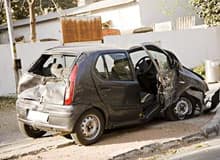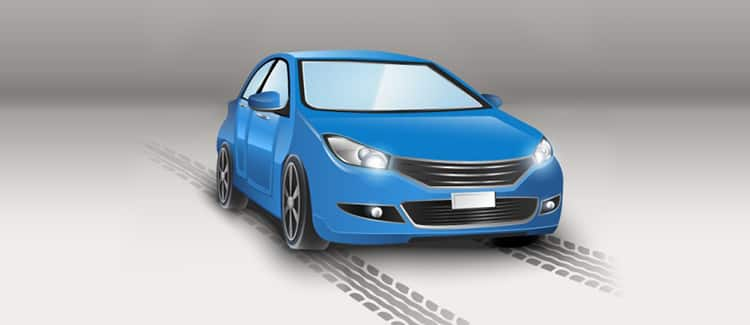Motor Insurance
Motor insurance or vehicle insurance covers various vehicle types, including cars, two-wheelers, trucks, autorickshaws, and electric vehicles (EVs).
Read more
Features of Motor Insurance
A vehicle insurance policy offers following features that can be beneficial for the policyholder:
- You can purchase motor insurance online on Policybazaar.com in a hassle-free manner from the comfort of your home. Simply choose the plan for yourself after comparing quotes from the right motor insurance companies.
- You can add or remove add-ons in your vehicle insurance policy as per your requirement. Add-ons are optional covers that you can purchase to enhance the coverage of your comprehensive motor insurance policy.
- Motor vehicle insurance not only covers damages from an accident but also theft, natural calamity, fire, vandalism, and manmade disasters.
- You can also raise a cashless claim against your motor insurance. Under this, you can get your vehicle repaired in a network garage without paying out of your pocket.
- Motor insurance also has a No Claim Bonus (NCB) feature. It is the discount on your premium you get from your insurer if you don't make any claims during the policy year.
Types of Motor Insurance
Motor vehicle insurance can be broadly classified under below heads:
-
Car insurance gives coverage against damages to your own car from accidents, fire, natural calamities and other unforeseen events. It also covers third party (TP) liabilities caused in an accident involving the insured car. While choosing car insurance, you should always compare policy premiums offered by various insurers to get the best deal. The premium amount would majorly depend on the car’s make & value, the state of registration, and its manufacturing year.
-
Two wheeler insurance or bike insurance provides financial and legal protection to bikes and scooters. It covers two-wheelers against own damages such as accidents, fire, theft, etc. Additionally, it includes any accidental loss caused to the third-person or property. Similar to car insurance, a two-wheeler policy's premium depends on the bike's age, make & model, registration year, etc.
-
Commercial vehicle insurance helps all commercial vehicle drivers reduce expenses they might incur from accidental damages to their vehicles. It covers all commercial vehicles, such as goods-carrying vehicles, trucks, auto-rickshaws etc., from unforeseen damages like theft, fire, collisions, and third-party damages.
Types of Vehicle Insurance Policy in India
The main three types of motor vehicle insurance policies offered in India include:
-
Third party insurance is a mandatory vehicle insurance policy under the Indian Motor Vehicles Act, 1988. It covers third person injuries or death in case of an accident involving the insured vehicle. However, third party insurance doesn't provide any direct benefit to the policyholder's vehicle.
-
Standalone own damage (OD) insurance protects the insured vehicle against any own damages arising out of unforeseen incidents like accidents, theft, fire, etc. You can opt for this policy with your existing third-party insurance to cover damages to your own vehicle.
-
Comprehensive insurance comprises both own damage and third-party coverage. It protects vehicle owners against financial losses from accidental damages or theft of the insured vehicle. Besides, it also covers third-party liabilities, including injuries, death, and property damages. Comprehensive motor vehicle insurance provides wider coverage and also carries a higher premium.
Difference Between Third Party, Comprehensive and OD Vehicle Insurance
Here is the table highlighting the key differences between third party, own damage, and comprehensive motor insurance policies:
| Points of Differences |
Third Party Insurance |
Own Damage Insurance |
Comprehensive Insurance |
| TP Property Cover |
Yes |
No |
No |
| TP Death |
Yes |
No |
No |
| OD Cover |
No |
Yes |
Yes |
| Premium |
As per IRDAI |
Less than Comprehensive |
Higher |
| Fire Cover |
No |
Yes |
Yes |
| Theft Cover |
No |
Yes |
Yes |
| Add-ons |
No |
Yes |
Yes |
| PA Cover |
Yes |
Yes |
Yes |
Why Should You Buy Vehicle Insurance?
Do you know that around 4 Lakh people meet with road accidents every month? A survey by the World Health Organization found that India had the highest number of road deaths globally in 2012.
Considering this and the poor road conditions, motor vehicle insurance became mandatory by law to drive legally on Indian roads. It not only gives financial protection to you but also covers third party damages. Driving without a vehicle insurance policy can lead to heavy penalties and even imprisonment for up to 3 months.
A few private insurers offer a large number of other utilities to the policyholders, like:
- Direct settlement or cashless claims at network garages
- Depreciation Cover
- Engine Protection Cover
- 24X7 Roadside assistance
- Towing Facility
Things to Consider While Buying Motor Insurance Online
While purchasing a motor insurance policy, it is important to consider the following pointers:
- Coverage: While purchasing motor insurance, check if that particular insurance plan is providing you with the coverage you require.
- Add-on: If you are not satisfied with the kind of coverage your desired comprehensive insurance plan is providing then you can always consider purchasing an add-on as provided by your insurer.
- Personal Accident Cover: Make sure that the motor insurance you are planning to purchase comes with the personal accident cover.
- Claim Settlement Ratio: Before purchasing a motor insurance plan, check the claim settlement ratio of your desired insurance provider.
- Network Garages: Check if your desired insurance provider has a good network of vehicle repair garages.
- No Claim Bonus: Check if the insurer offers NCB benefits at the time of vehicle insurance renewal and lets you transfer it to another insurer.
- Terms & Conditions: Make sure that you read the terms and conditions properly before signing any documents.
- Zero Depreciation Add-on Cover: As soon as the car comes out of the showroom, its price drops down to almost half the amount you have bought it for. To maintain the monetary value of your vehicle, it is suggested that you opt for the zero depreciation add-on to get the best coverage amount after the depreciation.
Factors That Affect Vehicle Insurance Premiums
When determining the motor insurance premium, insurance companies consider the following factors:
- Make & Model: The premium of your motor insurance plan depends upon your vehicle's make and model, cubic capacity, and variant.
- Age: The depreciation value, as well as the insured declared value, depends upon the age of your motor vehicle.
- Engine: The engine type whether it is a petrol engine or a diesel engine will affect the IDV that might increase the premium amount.
- Location: The premium amount of your vehicle depends upon the location of the car. For instance, if you live in a metro city then the premium of your vehicle insurance policy would be higher because of the high risk of an accident.
- Add-on: The motor insurance plan comes with a particular set of coverage but the insurance companies also provide add-ons so that you can enhance the coverage if you are not satisfied with the existing coverage.
- No Claim Bonus: The insurance companies provide a discount on the successive year motor insurance renewal for not raising a claim during the previous policy tenure.
- Online Purchase: For a hassle-free experience and lower premium rates, it is suggested to purchase vehicle insurance online as you can compare different plans and purchase the one that suits your requirement as well as your budget.
How to Buy Motor Insurance Online?
If you have purchased a new vehicle, you can easily compare and buy motor insurance for your vehicle from Policybazaar.com. Here is how to do it:
- Visit the ‘Motor Insurance’ page on the official website
- Enter your vehicle number on the given form
- Select your vehicle details such as make, model, RTO, variant and fuel type
- Fill in the registration form and proceed
- From the given vehicle insurance quotes, choose the one that suits your requirements
- Select additional covers that you wish to include in your plan
- Make premium payment online via any of the given payment methods
- Once you have made the payment, your motor insurance policy will be issued instantly.
Benefits of Buying Motor Insurance Online
When you purchase motor insurance online, you get to compare different plans in the comfort of your home. With the advent of digitalization, several insurers have launched their mobile apps to make your insurance buying experience even smoother. Since an insurance plan comes with validity, the policyholder is required to renew vehicle insurance before expiration. Buying vehicle insurance online has its own advantages. They are as follows:
- You do not have to pay the fees to any insurance agent as you are doing it yourself.
- You get to choose from multiple add-ons available on the website.
- You can add as well as remove any particular add-on as per your requirement.
- You do not have to visit the insurer's office to get the insurance plan.
- It saves a lot of your time as you have the option of doing it on your personal computer by visiting the website or on the mobile application of the insurer.
- When you buy motor insurance online then you get the option of making the payment online through secure gateways.
- The insurer will instantly issue the updated motor insurance plan to your email ID as soon as you make the payment.
Motor Vehicle Rules Updation by IRDAI
In an initiative to make motor insurance more affordable for buyers, IRDAI updated the rules in 2018 and 2020. Check the table below to learn about those updates.
| Insurance Cover |
IRDAI 2018 Regulation |
IRDAI 2020 Regulation Update |
| Third-party Only |
3 years third-party insurance for cars and 5 years third-party cover for bikes |
Retained |
| Standalone OD Cover (With Mandatory third-party cover) |
3 years & 5 years OD cover |
1-year Own Damage cover |
Here are some other updates made by the Insurance Regulatory & Development Authority of India.
- The sum insured amount for personal cars will be based on the road tax, on-road price, registration and manufacturer accessories.
- The expiry date of a long-term plan and third-party plan won't match if you purchase a standalone own damage insurance plan on different dates.
- The No Claim Bonus has been standardized by the IRDAI with a renewal range of 20%-50%.
- Electric vehicle insurance premium amount will get the benefit of a 15% discount on third party insurance cover. The electric vehicle owners can withdraw the long-term insurance from one company and transfer it to another.
Why buy Motor Insurance Online from Policybazaar Insurance Brokers Private Limited?
With multiple ways of purchasing vehicle insurance online, Policybazaar.com lets you compare different insurance plans in one place. Some other advantages of purchasing motor insurance from us include:
- 24*7 Claim Assistance: A policyholder can get claim assistance any time of the day through our dedicated claim assistance team available round the clock.
- Cashless Assurance: The cashless assurance facility allows you to avail cashless claim settlement without having to pay anything from your pocket.
- 3-Days Repair Facility: Policybazaar also offers a 3-day repair facility in the network garage of the respective insurance company.
- Free Pickup and Drop: If your car has been hit by an accident, we will also offer free pickup, get it repaired in the network garage and drop the insured car at your home.
- Self-Video Claims: With the help of self-video claims offered by Policybazaar, a policyholder can make and upload the video of car damages on the PB Claims App and get his/her claim settled in 24 hours.
- Windshield Claims at Home: This advantage lets a policyholder receive windshield repairs at home. Moreover, availing of this feature also does not affect the NCB of an insured car.
How to File a Motor Insurance Claim?
Raising a motor insurance claim involves some formalities and documentation, which depend upon the type of vehicle and nature of the loss.
Filing for a Claim in Case of Damage to Own Car/ Two Wheeler/ Commercial Vehicle/ Electric Vehicle
To initiate the motor insurance claim process, the policyholder is required to submit a detailed estimate of the loss to the insurance company. Surveyors then carefully inspect the damaged vehicle and submit their survey report with the insurance company who will review and examine it. Once the survey has been done, the insured vehicle is taken to the network garage for repairs. After repairs, the insurer will settle the claim directly with the garage.
Apart from the claim form, other documents required for processing claims are:
- Fitness Certificate (Commercial Vehicles)
- Driving License
- Registration Certificate Book
- Final Bill from repairers
- Police FIR
Third Party Claims
On receipt of the notice from the insured or third party, the matter is transferred to the Motor Accident Claim Tribunal. Complete information about the accident is obtained from the insured along with the following documents-
- Police Report
- Driving License
- Medical Certificate
- Death certificate in case of a fatal claim


































































